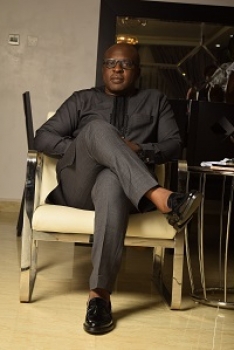Eneojoherbert
Others : Iam A Journalist, Marketing Specialist And A Brand Promoter
Wants to meet Work Partners : Media Persons, Journalists

This is the story of Amos Ukwile Edime and his multi million naira travels and tours company looking to blaze the Trail across the Nation.
As soon as the business hit the ground running, other challenges popped up their heads, one of such challenges being encountered in the industry in Nigeria is the government policies, having been in the industry for nineteen years now, Edime revealed that there were times the policies became too rigid to bear; particularly years 2016 and 2017; the aviation industry was threatened with exchange rate regime, it wasn’t fair enough and for those in the industry, it affected businesses largely.
He opined that Government needs to create a dedicated ministry for tourism, develop National Tourism Development plan and grant it optimum implementation. Another important issue is that of insecurity, the case of KAJURU castle in Kaduna where tourists were shot by Gun men is a setback for the industry as no serious tour operator will send his clients to such a place unless the Government addresses the challenge of insecurity.â€The Nigerian Government needs to understand the enormous growth potential of tourism to the growth of our GDP, The Nigerian Government should invest in creating tourism destinations that will attract tourists from all over the world†Edime wants the Nigerian Government to revisit the Centenary City project, according to him, the centenary city project was capable of attracting tourists and investors into the country that will boost the economy and strengthen the Naira.

Big brands are betting on a silver bullet solution to the world’s plastics pollution mess.
In September, Loop Industries, a startup with backing from several giant consumer
It was touted as the world’s first Infinite Loop recycling facility, using Loop Industries’ proprietary, “game-changing†chemical process to break down PET, the most widely used plastic, into its molecular building blocks and reassemble it into plastic that’s as good as new. Loop billed its “infinitely†recyclable plastic as a way to help companies meet ambitious goals to use more recycled plastic in their products and packaging without sacrificing performance.
A month later, stock short-selling company Hindenburg Research, which basically bets against companies, published a highly critical report on the Montreal company: “Our research indicates that Loop is smoke and mirrors with no viable technology.†Loop’s share price immediately plummeted by more than 30% and kept falling. The company now faces multiple class-action lawsuits and investigation by the U.S. Securities and Exchange Commission. Loop did not respond to a request for comment, but the company has publicly denied the allegations, saying Hindenburg’s claims “are either unfounded, incorrect, or based on the first iteration of Loop’s technology,†which was updated in 2017.
Whether or not Loop is able to prove that its innovation is not the “fiction†Hindenburg alleges, environmental experts warn of the folly of putting too much stock in one silver-bullet technology to fix the plastics problem — and they question the veracity of corporate sustainability commitments made by companies that back immature chemical recycling ventures while fighting solutions that have a track record of success.
“The more we allow ourselves to be swept up by the next shiny ‘new’ industry quick-fix, the more we allow ourselves to be distracted from the real transformative solutions that we must demand from industry,†said Claire Arkin of the nonprofit Global Alliance for Incinerator Alternatives (GAIA).
Today, few people, if any, can deny that we have a problem with plastic waste. A recent study from Pew Charitable Trusts found that if we continue to produce and consume plastic at the current rate, over the next decade we will see two times more plastic in the oceans each year.
But there is still considerable disagreement over who needs to do what about it. Environmental groups want companies to stop producing plastics, while industry thinks recycling is the key and puts the onus on consumers to recycle.
For their part, most major consumer brands have pledged to replace virgin plastic with post-consumer recycled content in their packaging to some extent. In the European Union and California, thanks to legislation, if companies fail to meet the mandated minimum level of recycled content, they will be fined.
This means the world now needs to ramp up the supply of recycled plastic. But there’s a problem. Familiar mechanical recycling methods typically handle only clean, sorted containers, and everything else ― flexible film packaging, greasy takeout boxes, synthetic fabrics ― is trash.
“It’s been marketed as a silver bullet to the plastic pollution problem, but in reality, the yield is quite low,†said Shanar Tabrizi, who tracks the progress of chemical recycling projects for Zero Waste Europe, a nonprofit based in Brussels. She notes that in July, GAIA found that during the chemical recycling process, about 50% of the carbon content of waste plastics is typically lost as greenhouse gases instead of being retained in the final plastic product. And most chemical recycling processes are energy-intensive, requiring high temperatures and pressures to break the plastics down.
In their report on chemical recycling, GAIA also found that of 37 chemical recycling facilities proposed in the US, some as far back as 2000, to date only three are operational and none has ever successfully produced recycled plastic on a commercial scale. They break waste plastic down to its building blocks and fail to take the next step to convert them back to plastics.
“The plastic that is produced by the chemical processes is too expensive to be used in products,†said Winnie Lau, a Pew researcher and lead author of its recent plastics report. “So they don’t do it.†Instead, the product is sold as fuel.
“In the end, you have an expensive technology that has to use a lot of energy to take a fossil product ― essentially that’s what plastic is ― and then turn it into a new fossil product,†Tabrizi says. “That’s not really in line with what we’re trying to achieve. We see it as a way to just build a new supply chain for the petrochemical industry.â€
But the technology’s potential has attracted many consumer brands. Environmental experts think it gives manufacturers an excuse to hold off on making meaningful changes in their methods of production until it becomes viable.
“Chemical recycling technology, in my opinion, is like the next red herring,†said Nusa Urbancic, campaigns director at Netherlands-based non-profit Changing Markets Foundation, who recently investigated certain companies’ pledges on plastic waste and their follow-up actions. “They are trying to present that there is this technology in the pipeline, and this enables the companies to keep doing business as usual, and it enables consumers to think that solutions are around the corner and they don’t have to feel guilty for using all this plastic packaging that ends up in waste.â€
In 2018, Loop Industries inked a flurry of agreements with big plastic-producing brands. Coca-Cola, PepsiCo, Danone and L’Occitane selected Loop Industries as a supplier of recycled plastic to help meet their targets. In November 2019, L’Occitane announced it expected to start using “100% sustainable PET plastic†in all its bottles ahead of schedule, “thanks to Loop Industries.†Following Hindenburg Research’s scathing report, Urbancic questions the kind of due diligence these companies had in place to “actually ensure that what Loop is doing is not a fairy tale.â€
A spokesperson for Danone told HuffPost, “To explore the technical feasibility of using Loop plastic, we have launched a small pilot production of recycled bottles with plastic supplied by Loop Industries.†The company declined to provide further details but added, “We take note of the results of the Hindenburg Research report and will conduct internal research and due diligence.†Danone also confirmed that it has alternative suppliers of recycled plastic and is on track to meet its goal of using at least 50% recycled plastic in its packaging by 2025.
PepsiCo did not respond to a request for comment.
A spokesperson from Coca-Cola told HuffPost the company considers “a myriad of technology providers, suppliers and developers to accelerate the commercialization and scaling of technologies†to help it achieve its sustainability targets. She noted that Coca-Cola bottlers in Norway and the Netherlands began using 100% recycled plastic this month.
Urbancic said that relying on new technology offers a convenient escape hatch for companies that fail to live up to their promises.
“They might say, ‘Oh, we didn’t have this technology, so we couldn’t meet our target,’†she said. “And this is a big problem because there is no accountability.â€
She pointed out that Coca-Cola has a history of backtracking on its goals. The company pledged to include 25% recycled content in its plastic bottles 30 years ago. In 2001, that goal was revised down to 10% within five years. The company later promised 25% by 2015; it missed that target and now aims for 50% by 2030.
Coca-Cola told HuffPost that the missed targets provided “an opportunity to learn.â€
It’s important for companies to make good on their promises to use recycled plastic, but that’s only one piece of the puzzle when it comes to solving the plastics problem. It will take everyone — governments, companies and consumers — doing “everything we know how to do†to stop the flow of plastics pollution, Lau said. And it has to start now.
Lau and her team at Pew analyzed all of the solutions that could feasibly be implemented on a large scale within the next 20 years and found that no one approach could address the overwhelming flow of plastics pollution. Rather, the problem requires a slew of solutions, such as eliminating unnecessary packaging, transitioning to return-and-reuse systems, substituting virgin with recycled plastic or switching to other materials like paper, collecting and disposing of waste plastic properly, and recycling.
If we do all that and then some, Lau said, “we can get rid of 80% of the pollution in 20 years, within one generation.â€
Chemical recycling may have a role to play sometime in the future for certain types of plastics that are impossible to recycle mechanically, such as flexible condiment sachets or medical waste, including single-use medical protective gear. But the Pew researchers projected that in the most optimistic scenario, chemical recycling wouldn’t be feasible for producing new plastic products at a large scale until 2030 or 2031. (For now, it works only for turning plastic waste into fuels — which they consider a disposal method, along with incineration.)
On the other hand, regular mechanical recycling of bottles and containers — especially those made from PET or the HDPE plastic found in laundry detergent jugs and shampoo bottles — is already well-established, even for making food-grade containers. If scaled up successfully over the next two decades, the Pew researchers found mechanical recycling could help prevent up to a third of the plastics produced from polluting the environment.
A better way for companies to help secure the production of high-quality recycled plastic, Urbancic said, is to participate in bottle deposit return programs.
When consumers buy a product, such as a bottle of soda or jug of milk, a small deposit, usually a few cents, is included in the price. Then, instead of putting those PET or HDPE containers into the recycling bin, consumers return them at designated collection points, such as stores or reverse vending machines, and get their deposits back. This boosts recycling rates by giving consumers a financial incentive to return containers and improves efficiency by effectively pre-sorting the most valuable plastics and eliminating contamination from dirty containers or other non-recyclable items.
Urbancic noted that these schemes have a history of success wherever they have been implemented. The 10 U.S. states with so-called bottle bills have 60% beverage container recycling rates, compared with 24% in states that don’t, according to the Container Recycling Institute. According to the OECD, a container deposit scheme in Ecuador boosted recycling of PET beverage bottles from 30% to 80% within one year of implementation. Norway has a nationwide deposit system for plastic bottles — and a 97% recycling rate.
But consumer companies in the U.S. have historically fought bottle deposit legislation because it increases costs for them and, they argue, makes their product slightly more expensive, which they worry could threaten sales. (Of course, consumers do not pay more if they redeem their deposits.) While there are different ways to fund these deposit systems, typically manufacturers have to pay into the programs and sometimes are responsible for getting the collected bottles to recyclers.
More than anything, experts say, we need to reduce plastic use overall. Companies can help, in part, by skipping unnecessary packaging or simply using plastic containers more than once, with return-and-refill systems. TerraCycle launched an initiative called Loop (not related to Loop Industries) partnering with consumer brands, the latest of which is Burger King, to deliver products in containers that consumers can later return to be refilled.
But it will take all of this — plus a sustained commitment to changing consumers’ and companies’ habits around plastic — to clean up the plastics mess.
“It’s human nature for us to want something simple that can just solve the problem,†Lau said. “But plastics are so pervasive … it isn’t something that one group can just go away and solve. It’s going to take all of us.â€
Advertisement

Link socials
Matches
